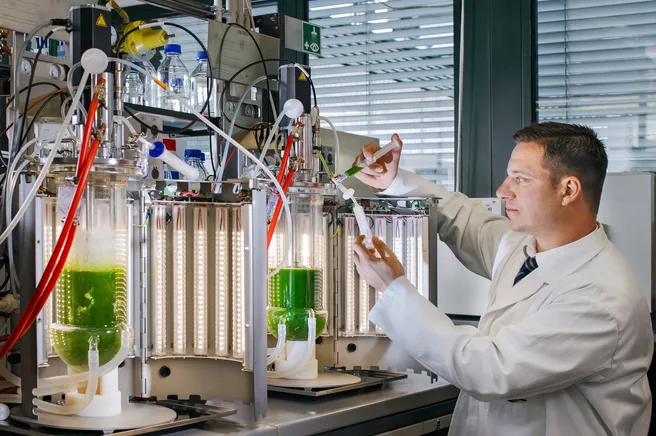Brück's focus is on the use of algae, particularly the marine green alga Dunaliella sp., for the sustainable production of carbon fibers. These could enable CO2-neutral vehicles, buildings, and wind turbines in the future.
Algae as the Key to a Sustainable Industry
Through photosynthesis, Dunaliella sp. converts CO2 into glycerol – the key precursor of sustainable carbon fibers. This technology could present a climate-friendly alternative for the construction and mobility sectors. Prof. Brück’s research helps to decipher the genetic and biochemical processes of the algae to further enhance efficiency.
In addition to algae-based carbon fiber production, Prof. Brück’s team has also developed methods for producing yeast oil as a substitute for palm oil and cocoa butter. This circular, CO2-neutral technology protects rainforests and reduces dependence on environmentally harmful plantations. Another highlight is algae-based recycling of rare earth elements from wastewater streams, enabling an eco-friendly recovery of critical raw materials.
Science as a Contribution to a Sustainable Future
Prof. Thomas Brück is convinced that research in this field can make a significant contribution to the transformation of industry and society. “Everyone can help preserve a livable world – through consumer choices, political engagement, or scientific innovation,” he says.
You can learn more about the current research on Dunaliella sp. and its biosynthesis of glycerol under salt stress in the article by Linda Keil, Norbert Mehlmer, Daniel Garbe, and Thomas Brück in the BIOspektrum issue 01/2025.
More information
Brück’s interview on Biospektrum: https://www.biospektrum.de/artikel/nachgefragt-prof-dr-thomas-brueck-im-interview-0 (in German)
Werner Siemens-Chair of Synthetic Biotechnology https://www.ch.nat.tum.de/en/wssb/home/
Press contact
